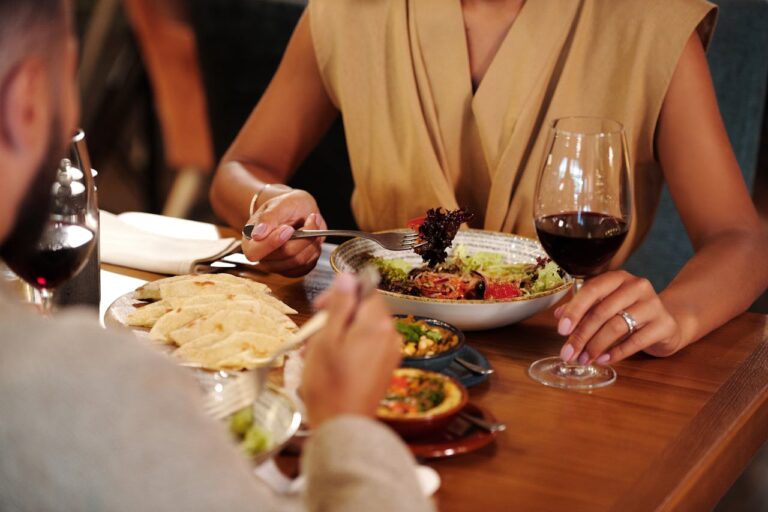There’s an art to navigating social gatherings, particularly dinners and formal functions. The right accoutrements like your Sunday best clothes and help from a Guelph flower store to complement it might be a step in the right direction, but it also pays to know what to do yourself. For many, these events are much like a fine dance, requiring one to balance etiquette when one mistake might speak volumes (particularly when deciding which fork to use for which dish). Still, with a good grasp of etiquette, you can forge ahead with a seemingly effortless grace and confidence, leaving a lasting positive impression in the minds of all the guests. Contrary to what many may imagine, there is less to understanding the subtleties of social graces than following an arcane and seemingly mystical system of rules, and more in being a little demonstrative of respect and consideration for your host and fellow diners.
1. The Art of the Grand Entrance (and Exit)
It’s always essential to start an engagement on the right foot. Aim to arrive punctually, within five to ten minutes of the scheduled time, neither too early nor too late. Arriving too early might catch your host unprepared, being too late spoils the rhythm of the event. Upon entering, greet your host warmly, with a sincere compliment about the event or their home. A small, thoughtful host gift (perhaps a bottle of wine, a box of artisanal chocolates, or a unique decorative item) is always a welcome gesture and shows how much you care. At the end, finish strong as you started strong by thanking your host sincerely for their hospitality. A brief, polite farewell to other guests is appropriate, but avoid drawn-out goodbyes that might eat up the host’s time.
2. Mastering Table Manners
At the dinner table, your actions speak volumes. Once seated, place your napkin on your lap. Observe your host; they will usually indicate when it’s appropriate to begin eating. As a rule of thumb (and to put an end to the common cutlery confusion), you start from the outside in with each course. Hold your fork in your left hand and your knife in your right when cutting, then spear your food with your fork, keeping the tines facing down. Chew with your mouth closed, and avoid talking with food in your mouth. If you need to excuse yourself from the table, simply say “pardon me” or “excuse me” and place your napkin loosely on your chair.
3. Engaging in Savvy Conversation
Good conversation is the foundation of any successful social interaction. Be an active listener, and show honest interest in what others are saying. To be polite, ask open-ended questions that prompt your partners to elaborate and carry on the conversation. Avoid monopolising the conversation or interjecting too frequently. As another guideline, it’s wise to avoid topics that are likely to be divisive or inflammatory, such as politics, religion, or personal matters that may cause offense, unless you’re well-acquainted with your listeners and you’re certain the discourse can stay civil. Instead, focus on lighter, more universally appealing fare (not to mention safer) such as travel, hobbies, books, or current events. Maintain eye contact, but avoid staring. A pleasant smile and open body language are key to encouraging others to engage with you.
4. Navigating Drink and Food
When it comes to refreshments, moderation is key. If you’re taking a few cocktails at The Diller Room (to name one example), drink responsibly and know your limits. If you’ve hit the limit, it is perfectly acceptable to decline an alcoholic beverage. When taking food from a buffet, avoid piling your plate high. Take reasonable portions instead, as you can always go back for seconds if you want more. Take note of dietary restrictions you might have; let your host know ahead of time if you can, but otherwise tactfully skip dishes you can’t have without causing unnecessary comment. Always offer to pass dishes to others before serving yourself.
5. The Digital Detachment
In an increasingly connected world, knowing when to disconnect is crucial. Your phone should be out of sight and on silent during social events, especially dinners. Resist the urge to check messages, emails, or social media. If you must take an urgent call, excuse yourself from the room. The focus of the event should be on engaging with the people around you, not with your device. Capturing a few discreet photos is usually acceptable, but avoid constant snapping or turning the event into a personal photo shoot.
By following these simple guidelines, not only will you impress your hosts and fellow guests, but you position yourself to have a better time. A good rule to remember with etiquette is that it’s not about rigid restriction; it’s the language of consideration, for your hosts, fellow guests, and yourself. Once mastered, you make everyone else feel comfortable, and in doing so, you give yourself the confidence to navigate any social gathering with finesse and poise. This foundation of respect is the secret ingredient that fosters stronger connections with your fellow guests, and turns a simple evening into a memorable one.


